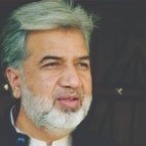

Go to Admin » Appearance » Widgets » and move Gabfire Widget: Social into that MastheadOverlay zone

Author: Ansar Abbasi
The PML-N and PPP, which mostly complain of NAB’s alleged high-handedness, are primarily responsible for the flawed accountability system as none of them despite having ruled the country for the last 10 years improved the anti-corruption mechanism.
Both the parties not only committed in their respective election manifestos to set up independent accountability commissions to check corruption but had also pledged the same in the Charter of Democracy signed between them over a decade back in London. However, after the lapse of almost 10 years of uninterrupted rule shared by these political parties since 2008, the NAB law and its structure remains the same as it used to work during ousted dictator Gen (retd) Pervez Musharraf’s tenure.
In the Charter of Democracy, signed by Nawaz Sharif and late Benazir Bhutto, the PPP and PML-N had agreed to replace the NAB with an independent accountability commission. The PPP during its tenure and the PML-N in its present term did not show any seriousness to improve the NAB law or replace it with an independent accountability commission. Only half-hearted efforts were made, apparently in response to media pressure. The matter relating to a reformed NAB or new anti-corruption mechanism was referred to parliamentary committees, both during the last PPP regime and also by the PML-N in its present tenure, but the exercise failed to produce any result because the top leaderships of the two parties were never keen to improve the system to check corruption.
During 2017, the chances for setting up of any meaningful accountability system received a serious dent when the top two opposition parties — PPP and PTI having their respective provincial governments in Sindh and KP- opposed the idea of any federal agency like NAB with powers to check corruption even in provincial departments. The PPP and the PTI came up with the idea of provincial governments’ own accountability apparatus, which meant to restrict the NAB’s domain to the federal government only.
These proposals cropped up last year after parliament discussed the idea of across-the-board accountability of all, including judges and generals in the purview of the proposed commission. Amongst the two houses of parliament, the Senate was a bit enthusiastic to have a reformed system of accountability but the National Assembly generally remained indifferent. The Senate had even approved recommendations of a house committee asking for a revised accountability system covering all including the judiciary and the armed forces.
Even the Senate chairman had initiated a proposal in an open letter to public underlying that the current system of accountability has failed to curb the menace of corruption and threatens democratic polity and harmony of our society and thus needs a complete review. Raza Rabbani noted, “This system of accountability has fallen apart, wherein any attempt to amend the existing system, in patchworks, will not work…… There is dire need to holistically review the existing accountability mechanism.”
Raza Rabbani proposed a Federal Commission for Accountability for investigation and scrutiny of evidence by NAB with preliminary decision as to filing of reference or closure of the investigation to be taken by NAB and cases approved for reference as well as closure of investigation.
Rabbani wanted across-the-board accountability system for which he had proposed to the following formation of the commission: one member judicial commission, a sitting judge of the Supreme Court, to be nominated by the Chief Justice of Pakistan; one member armed forces, not below the rank of lieutenant general, to be nominated by the Joint Chiefs of Staff; member civil services, the senior-most serving grade-22 officer; one member police and civil armed forces, to be nominated by the Ministry of Interior; four members, one each from bar associations, human rights activists, journalists and professionals, to be nominated by the Senate chairman, National Assembly Speaker and Chief Justice of Pakistan; four members of Parliament, equally from both the Houses and half from the treasury and half from opposition benches, to be nominated by the Senate chairman and National Assembly Speaker, respectively. However, Rabbani’s recommendations also fell on fear ears of his party’s own leadership as well as that of the PML-N.
(Published in Monthly Tribute International on 01-03-2018)
You must be logged in to post a comment Login